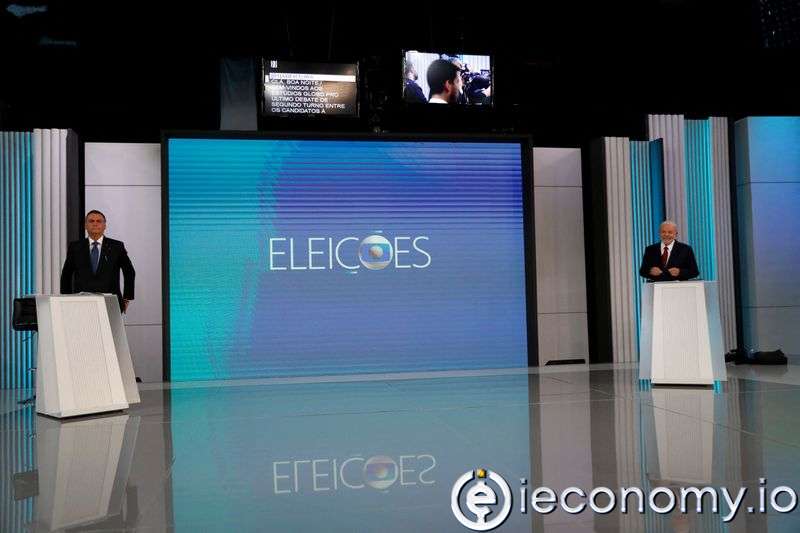5766
0
Bolsonaro-Lula presidential race is neck and neck in Brazil
As Brazil's heated presidential race heats up ahead of Sunday's vote, opinion polls on Saturday showed right-wing President

Yazar: Charles Porter
Yayınlanma: 30 Ekim 2022 13:43
Güncellenme: 4 Mart 2026 13:28
Bolsonaro-Lula presidential race is neck and neck in Brazil
As Brazil's heated presidential race heats up ahead of Sunday's vote, opinion polls on Saturday showed right-wing President Jair Bolsonaro eroding a slight lead over his leftist rival Luiz Inacio Lula da Silva in most polls.
Polls by pollsters Datafolha and Quaest showed Lula with 52% of the valid votes, compared to 48% for Bolsonaro. A poll by pollster MDA showed Lula's advantage narrowed to just 2 percentage points, equal to the margin of error of a poll commissioned by the CNT, the transportation sector lobby. Most polls still show Lula is the favorite for a third term and has made a remarkable political recovery after being jailed on corruption charges. But Bolsonaro outperformed opinion polls in the first round of voting on October 2, and many analysts say the election could go either way. But recent opinion polls by polling companies IPEC and AtlasIntel showed Lula with a stable and slightly larger lead. IPEC showed the leftist ahead with 54% to 46% of valid votes, excluding undecided voters and those planning to spoil ballots. AtlasIntel, one of the most accurate pollsters in the first round, showed Lula maintaining his lead by 7 percentage points. Bolsonaro concluded his campaign with a motorcycle rally with supporters in the key state of Minas Gerais. Lula marched with thousands of supporters down one of Sao Paulo's main avenues after telling foreign journalists that his rival was unfit to govern. The two highly polarized figures attacked each other's character and record in their final televised debate on Friday night. Bolsonaro opened the debate by denying reports that he would adjust the minimum wage for inflation, saying instead that if re-elected he would raise the minimum wage to 1,400 reais ($260) a month, a move not included in the government's 2023 budget. Analysts, whose campaigns have focused on wooing swing voters, said the president gained little ground in the debate to win a race that polls have shown more or less flat since Lula led the first round of voting by 5 percentage points. That result was better for Bolsonaro than most polls showed and gave him momentum heading into the month, but the last two weeks of the campaign have offered headwinds. A week ago, one of Bolsonaro's allies opened fire on federal police officers who came to arrest him. And on Sunday, one of his closest colleagues, Congresswoman Carla Zambelli, chased a Lula supporter at gunpoint into a Sao Paulo restaurant after a political argument on the street. Zambelli told reporters that she had deliberately defied an electoral law banning the carrying of firearms 24 hours before the election. In their first debate this month, Lula criticized Bolsonaro's fight against a pandemic that has killed nearly 700,000 Brazilians, while Bolsonaro focused on corruption scandals that have tarnished the reputation of Lula's Workers' Party. On Friday night, both candidates made repeated references to Lula's two terms as president from 2003 to 2010, when high commodity prices helped boost the economy and fight poverty. Lula promised to revive those boom times, while Bolsonaro argued that existing social programs were more effective. Follow Global Economic Developments on Social Media! Click here to follow Ieconomy official Facebook account! Click here to follow Ieconomy official Instagram account! Click here to follow Ieconomy official Twitter account!İLGİLİ HABERLER





European stocks soared and focus shifted to German retail sales after Powell's speech!

Forex Signal For TRY/USD: Inflation Slowdown in November.

Forex Signal For GBP/USD: Bullish Trend Still Not Breaking While Recovery Continues.

Forex Signal For EUR/USD: Starry US Data Points to Higher Fed Increases.

Forex Signal For BTC/USD: Downside Continues as Bitcoin Recovery Moves Less.
En Popüler Haberler
Yorum Yap
Yorumlar
Henüz yorum yapan yok! İlk yorumu siz yapın...